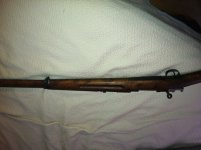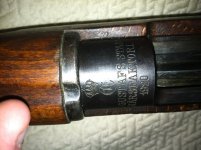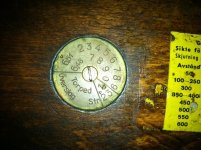Hi guys,
I was just given a Swedish Mauser, M96, 1920, 6.65 x 55. I know nothing about them and I'm trying to learn very quickly. Any help is MUCH appreciated!
1) Why the heck did they have to number all the parts, other than to be disappointed when they don't match? Looks like all mine match, except the cleaning rod and it DOESN'T fit in the barrel. Should I just assume that it was mismatched somewhere in the past 92 years? Can I buy any replacement M96 cleaning rod and be okay?
2) All my numbers are '215'. Are those numbers unique to this, and only this, single rifle? (Am I crazy to think I can find parts with that number on them floating around?)
3) What accessories (if any) should I get to use on the threaded barrel?
Many thanks...8 hours ago was the first I'd ever really heard about the Mausers.
I was just given a Swedish Mauser, M96, 1920, 6.65 x 55. I know nothing about them and I'm trying to learn very quickly. Any help is MUCH appreciated!
1) Why the heck did they have to number all the parts, other than to be disappointed when they don't match? Looks like all mine match, except the cleaning rod and it DOESN'T fit in the barrel. Should I just assume that it was mismatched somewhere in the past 92 years? Can I buy any replacement M96 cleaning rod and be okay?
2) All my numbers are '215'. Are those numbers unique to this, and only this, single rifle? (Am I crazy to think I can find parts with that number on them floating around?)
3) What accessories (if any) should I get to use on the threaded barrel?
Many thanks...8 hours ago was the first I'd ever really heard about the Mausers.




